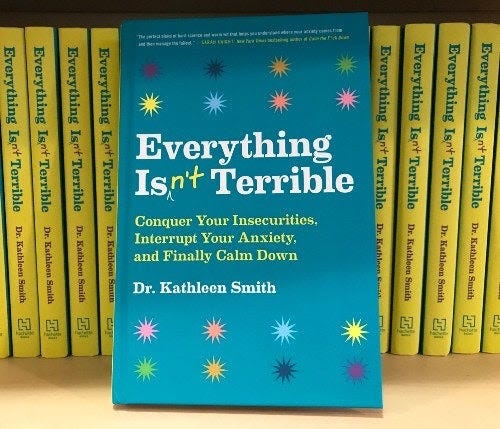We all have topics that bring out the reactivity in us.
Often they are subjects like money, sex, politics, religion, or death. Rather than learn to manage ourselves while thinking and talking about them, we often try to teach others how to not push our buttons. This is because we often rely on others to fill in the gaps of our own emotional maturity.
When I experienced deep anxiety about student loan debt in my 20s, I would become very reactive when other people would talk about their financial challenges. I would quickly change the subject or exit the conversation. I recall snapping at my dad, “I can’t talk about money with you! It stresses me out too much!”
I often have conversations with therapy clients who are trying to teach family members or friends how to avoid certain topics, or how to help make them feel better.
This can look like:
Trying to teach a family member not to talk about politics.
Trying to teach your mother not to fret about her weight, because it makes you anxious.
Telling your partner not to talk about work problems because it stresses you out.
Telling a parent not to talk about aging, their death, their will, etc. because it upsets you.
I’m not saying that you can’t ask people to talk about something else. Or that there aren’t moments when you need to tell people that you will not engage in conversation if it’s inappropriate or harmful. But I do think there are other moments that are opportunities for managing ourselves instead of teaching others to be more sensitive to our own anxieties. To make space for hearing about people’s challenges while we regulate our own anxious reactions.
The trouble is, it’s difficult to manage anxiety when you don’t know what you actually think about a stressful topic. Working on one’s own emotional maturity requires you to:
Get clearer about your own thinking.
Hold onto that thinking while in relationship with others.
How does this look in real time? Let’s say, that you absolutely can’t stand it when your mother shames herself for eating french fries. First, it’s useful to go and do your own thinking about food/diet culture. Then, you have to access that thinking when you’re out to dinner with her. No easy task.
When she inevitably fry-shames herself, what do you do?
You could:
A) Scold her for shaming herself.
B) Direct her to be kinder to herself.
C) Teach her why this topic is upsetting to you.
Or . . .
D) Pop a french fry in your mouth and say something like, “I think these are delicious, Mom, and I’m happy to be here with you.”
I’m not saying that A, B, and C are bad choices. I just think we forget that D is also an option because the first three reactions are so automatic. We forget that we can take a position ourselves, and not get caught up in functioning for others. That we actually can calm down a little with or without the cooperation of others. This is fantastic news.
Think about the topics that bring up anxiety for you. Are there opportunities to get clearer about your own thinking instead of teaching others to not upset you? Opportunities to decide what you actually believe instead of automatically borrowing the thinking of others?
When we practice managing ourselves and knowing our own minds in our close relationships, we become less sensitive over time to anxious conversation topics. We can enjoy our relationships more, not having to stick to the superficial. And we can put our energy where it’s most effective—directing ourselves instead of managing others.
News from Kathleen
For Forge Mag, I wrote about dealing with anxiety in relationships in this pandemic transition time.
For the Bowen Center, I interviewed faculty member Kathleen Cotter Cauley, MFT about stepping back into post-pandemic life.
Want to support my free newsletter? Buy me a coffee to keep the thoughts flowing.
Want to read more of my writing? You can read my weekly essay for Medium’s Forge Magazine, read old newsletters at my website, or buy my book Everything Isn't Terrible from Amazon, Barnes and Noble, Indiebound, or your local bookstore (best option).
Want a free anxiety journal? Calming Down & Growing Up: A 30 Day Anxiety Journal includes thirty daily prompts to help you reflect on and respond to your anxious behaviors. To receive a copy, just email me your receipt.
Follow me on Twitter, Facebook, or Instagram, or email me if you have questions about my therapy practice in Washington, DC, virtual Bowen theory coaching, or having me speak to your group.
Want to learn more about Bowen theory? Visit the Bowen Center’s website to learn more about their conferences and training programs.





